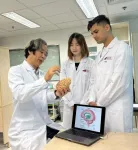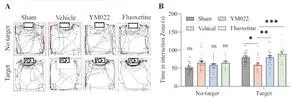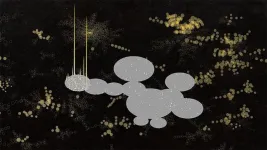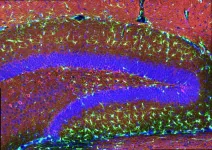(Press-News.org) Depression is one of the most common mental illnesses in the world, but current anti-depressants have yet to meet the needs of many patients. Neuroscientists from City University of Hong Kong (CityU) recently discovered a small molecule that can effectively alleviate stress-induced depressive symptoms in mice by preventing aversive memory formation with a lower dosage, offering a new direction for developing anti-depressants in the future.
“Depression affects millions of individuals worldwide, necessitating more effective treatments. Conventional methods, such as drug therapy with delayed onset of action and psychotherapy, have limitations in yielding satisfactory results for many patients. A pioneering advancement in treatment is urgently needed,” said Professor He Jufang, Wong Chun Hong Chair Professor in Translational Neuroscience at CityU.
Previous research found that stress leads to neural plasticity changes in brain’s valence-coding systems (“valence” refers to the degree to which something is pleasurable or aversive), which are strongly associated with depression, post-traumatic stress disorders and anxiety disorders. Also, some studies revealed that depression is correlated with the hyperactivated amygdala. “However, the neural mechanism that mediates depression in amygdala is still poorly understood,” said Professor He.
Over the years, Professor He’s research group has focused on memory formation and encoding studies. Previously, they discovered that cholecystokinin (CCK), a key neuromodulator, is crucial for inducing long-term potentiation (LTP) – a lasting increase in communication strength between neurons – to enable memory formation. They also found that the CCK and CCK-B receptors (CCKBR is one of three known types of CCK receptors in the central nervous system) mediate neuroplasticity, as well as visual and sound associative memory formation, in the auditory cortex, and trace fear memory formation in the amygdala. Other studies have found that CCKBR antagonist (which blocks the binding of the CCK and CCK-B receptors, thus inhibiting the effect of the binding) exhibited an anti-depressant effect in mice.
So Professor He’s group hypothesized that CCK might facilitate aversive memory formation by enabling LTP in the basolateral amygdala (BLA) – a brain region involved in processing emotional memories and thought to be dysregulated in depression, thus enhancing the development of depression.
In their latest study, they tested this hypothesis using various experimental methods, including in vitro electrophysiological recording, optogenetic manipulation, drug manipulation and behavioural analysis of mice, to examine the critical role of CCK and CCKBR in depression. They found that a CCKBR antagonist called YM022 had an anti-depressant-like effect by blocking neuroplasticity-caused aversive memory formation in mice.
The results of the in-vitro recording in the BLA showed that the YM022 significantly suppressed neuroplasticity. The neuroplasticity induction rate reached 72.3% in the control group; but it was only 10.2% in the drug-treated group.
Moreover, the team underwent a series of behavioural tests to determine the antagonist’s efficacy. The results showed that depressive behaviours in mice treated with a CCKBR antagonist was reduced.
“Remarkably, the YM022 shows anxiolytic effects with a dose of 3.0 ug/kg, which is 3,000 times lower than the required dosage of current antidepressants,” said Professor He. “These results indicate that CCKBR is a potential target for depression treatment, and that the selected antagonist, YM022, may be a good anti-depressant candidate due to its extremely small effective dose. This paves the way for targeted drug development that specifically addresses the abnormalities observed in the basolateral amygdala.”
Next, the research team will focus on the precise mechanisms and potential side effects of CCKBR antagonists to set the stage for future clinical trials involving human subjects.
The findings were published in the scientific journal Molecular Psychiatry, titled “Cholecystokinin B Receptor Antagonists for the Treatment of Depression via Blocking Long-term Potentiation in the Basolateral Amygdala”.
The corresponding author of the paper is Professor He, who is also the Chair Professor of Neuroscience at CityU. The co-first authors of the paper are Dr Zhang Xu, Dr Muhammad Asim and Ms Fang Wei, all former or current PhD students of Professor He.
The research was supported by Hong Kong Research Grants Council, the Innovation and Technology Fund, the Health and Medical Research Fund, and the following charitable foundations: the Wong Chun Hong Endowed Chair Professorship, the Charlie Lee Charitable Foundation, and the Fong Shu Fook Tong Foundation.
https://www.cityu.edu.hk/research/stories/2023/11/16/small-molecule-blocks-aversive-memory-formation-providing-potential-treatment-target-depression
END
A small molecule blocks aversive memory formation, providing a potential treatment target for depression
2023-11-16
ELSE PRESS RELEASES FROM THIS DATE:
Plants that survived dinosaur extinction pulled nitrogen from air
2023-11-16
DURHAM, N.C. -- Once a favored food of grazing dinosaurs, an ancient lineage of plants called cycads helped sustain these and other prehistoric animals during the Mesozoic Era, starting 252 million years ago, by being plentiful in the forest understory. Today, just a few species of the palm-like plants survive in tropical and subtropical habitats.
Like their lumbering grazers, most cycads have gone extinct. Their disappearance from their prior habitats began during the late Mesozoic and continued into the early Cenozoic Era, punctuated by the cataclysmic asteroid impact and volcanic activity that mark the K-Pg boundary 66 million years ago. However, unlike the dinosaurs, somehow a few groups ...
The mind’s eye of a neural network system
2023-11-16
WEST LAFAYETTE, Ind. – In the background of image recognition software that can ID our friends on social media and wildflowers in our yard are neural networks, a type of artificial intelligence inspired by how own our brains process data. While neural networks sprint through data, their architecture makes it difficult to trace the origin of errors that are obvious to humans — like confusing a Converse high-top with an ankle boot — limiting their use in more vital work like health care image analysis or research. A new tool developed at Purdue University makes finding those errors as simple as spotting mountaintops from an airplane.
“In a sense, if a neural ...
Study finds motorist disorientation syndrome is not only caused by vestibular dysfunction
2023-11-16
Amsterdam, November 16, 2023 – A large case series aimed at understanding the factors underlying Motorist Disorientation Syndrome (MDS) has found that patients experience severe, consistent symptoms comparable to vestibular migraine. Previously there has been speculation that underlying peripheral vestibular hypofunction, when the inner ear part of the balance system is not working properly, contributes to this presentation. However, vestibular deficits were not a consistent feature in the patients studied. The findings have been published in the Journal of Vestibular Research.
In ...
Rabies virus variants from marmosets are found in bats
2023-11-16
Rabies virus variants closely related to variants present in White-tufted marmosets (Callithrix jacchus) have been detected in bats in Ceará state, Northeast Brazil.
Rabies is a deadly disease for humans. Its emergence in distinct wildlife species is a potential source of human infection and hence a public health concern. Marmosets are common in forests and conservation units throughout Brazil. In or near urban areas, they are often captured as pets and later abandoned. They have been linked ...
How a mutation in microglia elevates Alzheimer’s risk
2023-11-16
A rare but potent genetic mutation that alters a protein in the brain’s immune cells, known as microglia, can give people as much as a three-fold greater risk of developing Alzheimer’s disease. A new study by researchers in The Picower Institute for Learning and Memory at MIT details how the mutation undermines microglia function, explaining how it seems to generate that higher risk.
“This TREM2 R47H/+ mutation is a pretty important risk factor for Alzheimer’s disease,” said study lead author Jay Penney, a former postdoc in the MIT lab of Picower Professor Li-Huei ...
International team uses Insilico Medicine’s AI platform to find dual targets for aging and cancer
2023-11-16
An international research team is the first to use artificial intelligence (AI) analysis to identify dual-purpose target candidates for the treatment of cancer and aging, the most promising of which was experimentally validated. The findings were published in the journal Aging Cell.
Researchers from the University of Oslo, University of Chicago Pritzker School of Medicine, and clinical stage AI-driven drug discovery company Insilico Medicine used Insilico’s AI target discovery engine, PandaOmics, to analyze transcriptomic data derived from ...
New therapeutic strategy to reduce neuronal death in amyotrophic lateral sclerosis
2023-11-16
Amyotrophic lateral sclerosis (ALS) is a neurodegenerative disease that affects neurons in the brain and spinal cord causing loss of muscle control. A study by the University of Barcelona has designed a potential therapeutic strategy to tackle this pathology that has no treatment to date. It is a molecular trap that prevents one of the most common genetic ALS-causing peptide compounds, the Poly-GR dipeptide, from causing its toxic effects in the body. The results show that this strategy reduces the death of neurons in patients and in an animal model (vinegar flies) of the disease.
The first authors of this international research study published in the journal Science Advances are ...
Breakthrough in bladder cancer research
2023-11-16
After 40 years of treating metastatic bladder cancer with chemotherapy as a primary treatment, scientists now present a new approach using immunotherapy combinations. The results of not just one, but two studies have been presented at the European Society for Medical Oncology (ESMO) conference in Madrid. The outcomes of these studies are going to revolutionize the landscape of bladder cancer treatment.
Traditionally, cisplatin-based chemotherapy has been the standard treatment for bladder cancer patients who are able to tolerate this drug. However, responses have been limited, and durable outcomes rare. Over the past years, two phase-3 clinical trials studied the effects ...
Study: Temperature variability reduces nesting success
2023-11-16
Ithaca, N.Y.—Many songbirds are nesting earlier in spring because of warmer temperatures brought about by climate change. But the shift brings another danger that is especially deadly for nestlings: greater exposure to temperature variability in the form of cold snaps and heat waves. Such extremes result in more nest failures. These findings come from a Cornell Lab of Ornithology study just published in the journal Nature Communications.
"When we talk about temperature changes, the focus is mostly on averages," said co-lead author Conor Taff, a researcher in Cornell University's ...
Understanding survival factors in critically ill patients on extracorporeal membrane oxygenation
2023-11-16
Extracorporeal membrane oxygenation (ECMO) is a widely used advanced life support procedure that provides cardiac and respiratory support to critically ill patients. ECMO use has been increasing exponentially over the last decade as it has shown success in resuscitating patients in critical situations like the COVID-19 pandemic and is now a lifesaving treatment modality in intensive care units (ICUs). However, prolonged ECMO use may be associated with an increased risk of mortality. Identifying risk factors for in-hospital mortality and developing standardized nursing practice guidelines for ECMO management may improve the survival rates in patients.
In this vein, ...










